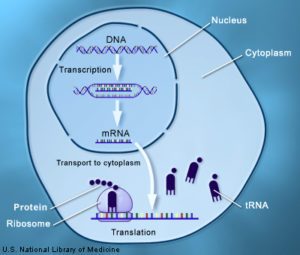Mutations
Learning Objectives
By the end of this section, you will be able to:
- Describe how mutations affect protein synthesis and its products.
In both prokaryotes and eukaryotes, the major purpose of DNA is to provide the information needed to construct the proteins necessary for the cell can perform all of its functions. Proteins are large, complex molecules that play many critical roles in the body. They do most of the work in cells and are required for the structure, function, and regulation of the body’s tissues and organs.
The information to make proteins is stored in an organism’s DNA. Each protein is coded for by a specific section of DNA called a gene. A gene is the section of DNA required to produce one protein. Genes are typically hundreds or thousands of base pairs in length because they code for proteins made of hundreds or thousands of amino acids.
A gene mutation is a permanent alteration in the DNA sequence that makes up a gene, such that the sequence differs from what is found in most people. Mutations range in size; they can affect anywhere from a single DNA building block (base pair) to a large segment of a chromosome that includes multiple genes.
Since the DNA sequence found within a gene controls protein synthesis. If the DNA sequence is altered, this can alter the amino acid sequence within a protein. This can have a variety of potential effects, which will be discussed in this chapter.


